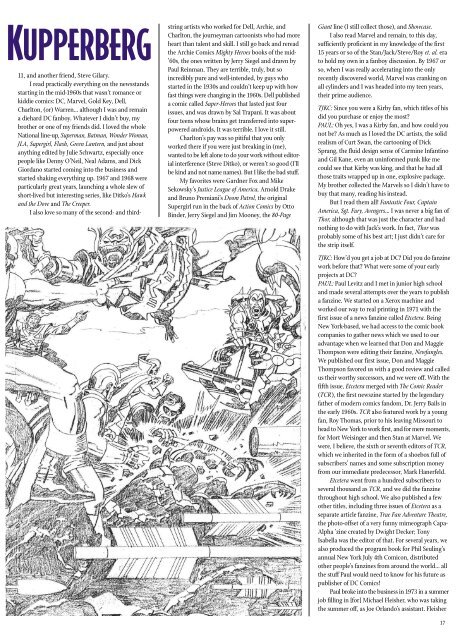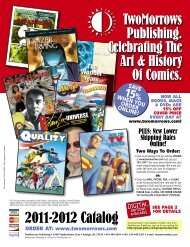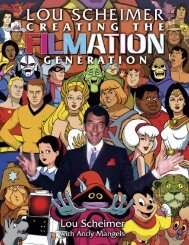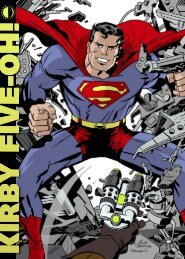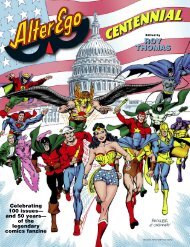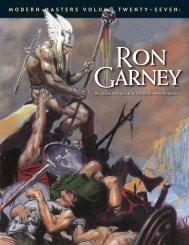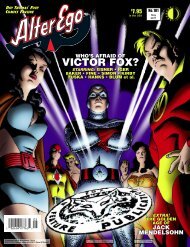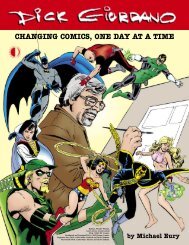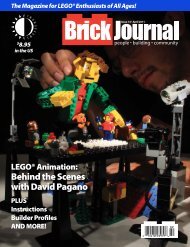here - TwoMorrows Publishing Store
here - TwoMorrows Publishing Store
here - TwoMorrows Publishing Store
Create successful ePaper yourself
Turn your PDF publications into a flip-book with our unique Google optimized e-Paper software.
Kupperberg<br />
11, and another friend, Steve Gilary.<br />
I read practically everything on the newsstands<br />
starting in the mid-1960s that wasn’t romance or<br />
kiddie comics: DC, Marvel, Gold Key, Dell,<br />
Charlton, (or) Warren… although I was and remain<br />
a diehard DC fanboy. Whatever I didn’t buy, my<br />
brother or one of my friends did. I loved the whole<br />
National line-up, Superman, Batman, Wonder Woman,<br />
JLA, Supergirl, Flash, Green Lantern, and just about<br />
anything edited by Julie Schwartz, especially once<br />
people like Denny O’Neil, Neal Adams, and Dick<br />
Giordano started coming into the business and<br />
started shaking everything up. 1967 and 1968 were<br />
particularly great years, launching a whole slew of<br />
short-lived but interesting series, like Ditko’s Hawk<br />
and the Dove and The Creeper.<br />
I also love so many of the second- and thirdstring<br />
artists who worked for Dell, Archie, and<br />
Charlton, the journeyman cartoonists who had more<br />
heart than talent and skill. I still go back and reread<br />
the Archie Comics Mighty Heroes books of the mid-<br />
’60s, the ones written by Jerry Siegel and drawn by<br />
Paul Reinman. They are terrible, truly, but so<br />
incredibly pure and well-intended, by guys who<br />
started in the 1930s and couldn’t keep up with how<br />
fast things were changing in the 1960s. Dell published<br />
a comic called Super-Heroes that lasted just four<br />
issues, and was drawn by Sal Trapani. It was about<br />
four teens whose brains get transferred into superpowered<br />
androids. It was terrible. I love it still.<br />
Charlton’s pay was so pitiful that you only<br />
worked t<strong>here</strong> if you were just breaking in (me),<br />
wanted to be left alone to do your work without editorial<br />
interference (Steve Ditko), or weren’t so good (I’ll<br />
be kind and not name names). But I like the bad stuff.<br />
My favorites were Gardner Fox and Mike<br />
Sekowsky’s Justice League of America, Arnold Drake<br />
and Bruno Premiani’s Doom Patrol, the original<br />
Supergirl run in the back of Action Comics by Otto<br />
Binder, Jerry Siegel and Jim Mooney, the 80-Page<br />
Giant line (I still collect those), and Showcase.<br />
I also read Marvel and remain, to this day,<br />
sufficiently proficient in my knowledge of the first<br />
15 years or so of the Stan/Jack/Steve/Roy et. al. era<br />
to hold my own in a fanboy discussion. By 1967 or<br />
so, when I was really accelerating into the only<br />
recently discovered world, Marvel was cranking on<br />
all cylinders and I was headed into my teen years,<br />
their prime audience.<br />
TJKC: Since you were a Kirby fan, which titles of his<br />
did you purchase or enjoy the most?<br />
PAUL: Oh yes, I was a Kirby fan, and how could you<br />
not be? As much as I loved the DC artists, the solid<br />
realism of Curt Swan, the cartooning of Dick<br />
Sprang, the fluid design sense of Carmine Infantino<br />
and Gil Kane, even an uninformed punk like me<br />
could see that Kirby was king, and that he had all<br />
those traits wrapped up in one, explosive package.<br />
My brother collected the Marvels so I didn’t have to<br />
buy that many, reading his instead.<br />
But I read them all! Fantastic Four, Captain<br />
America, Sgt. Fury, Avengers… I was never a big fan of<br />
Thor, although that was just the character and had<br />
nothing to do with Jack’s work. In fact, Thor was<br />
probably some of his best art; I just didn’t care for<br />
the strip itself.<br />
TJKC: How’d you get a job at DC? Did you do fanzine<br />
work before that? What were some of your early<br />
projects at DC?<br />
PAUL: Paul Levitz and I met in junior high school<br />
and made several attempts over the years to publish<br />
a fanzine. We started on a Xerox machine and<br />
worked our way to real printing in 1971 with the<br />
first issue of a news fanzine called Etcetera. Being<br />
New York-based, we had access to the comic book<br />
companies to gather news which we used to our<br />
advantage when we learned that Don and Maggie<br />
Thompson were editing their fanzine, Newfangles.<br />
We published our first issue, Don and Maggie<br />
Thompson favored us with a good review and called<br />
us their worthy successors, and we were off. With the<br />
fifth issue, Etcetera merged with The Comic Reader<br />
(TCR), the first newszine started by the legendary<br />
father of modern comics fandom, Dr. Jerry Bails in<br />
the early 1960s. TCR also featured work by a young<br />
fan, Roy Thomas, prior to his leaving Missouri to<br />
head to New York to work first, and for mere moments,<br />
for Mort Weisinger and then Stan at Marvel. We<br />
were, I believe, the sixth or seventh editors of TCR,<br />
which we inherited in the form of a shoebox full of<br />
subscribers’ names and some subscription money<br />
from our immediate predecessor, Mark Hanerfeld.<br />
Etcetera went from a hundred subscribers to<br />
several thousand as TCR, and we did the fanzine<br />
throughout high school. We also published a few<br />
other titles, including three issues of Etcetera as a<br />
separate article fanzine, True Fan Adventure Theatre,<br />
the photo-offset of a very funny mimeograph Capa-<br />
Alpha ’zine created by Dwight Decker; Tony<br />
Isabella was the editor of that. For several years, we<br />
also produced the program book for Phil Seuling’s<br />
annual New York July 4th Comicon, distributed<br />
other people’s fanzines from around the world… all<br />
the stuff Paul would need to know for his future as<br />
publisher of DC Comics!<br />
Paul broke into the business in 1973 in a summer<br />
job filling in [for] Michael Fleisher, who was taking<br />
the summer off, as Joe Orlando’s assistant. Fleisher<br />
17


